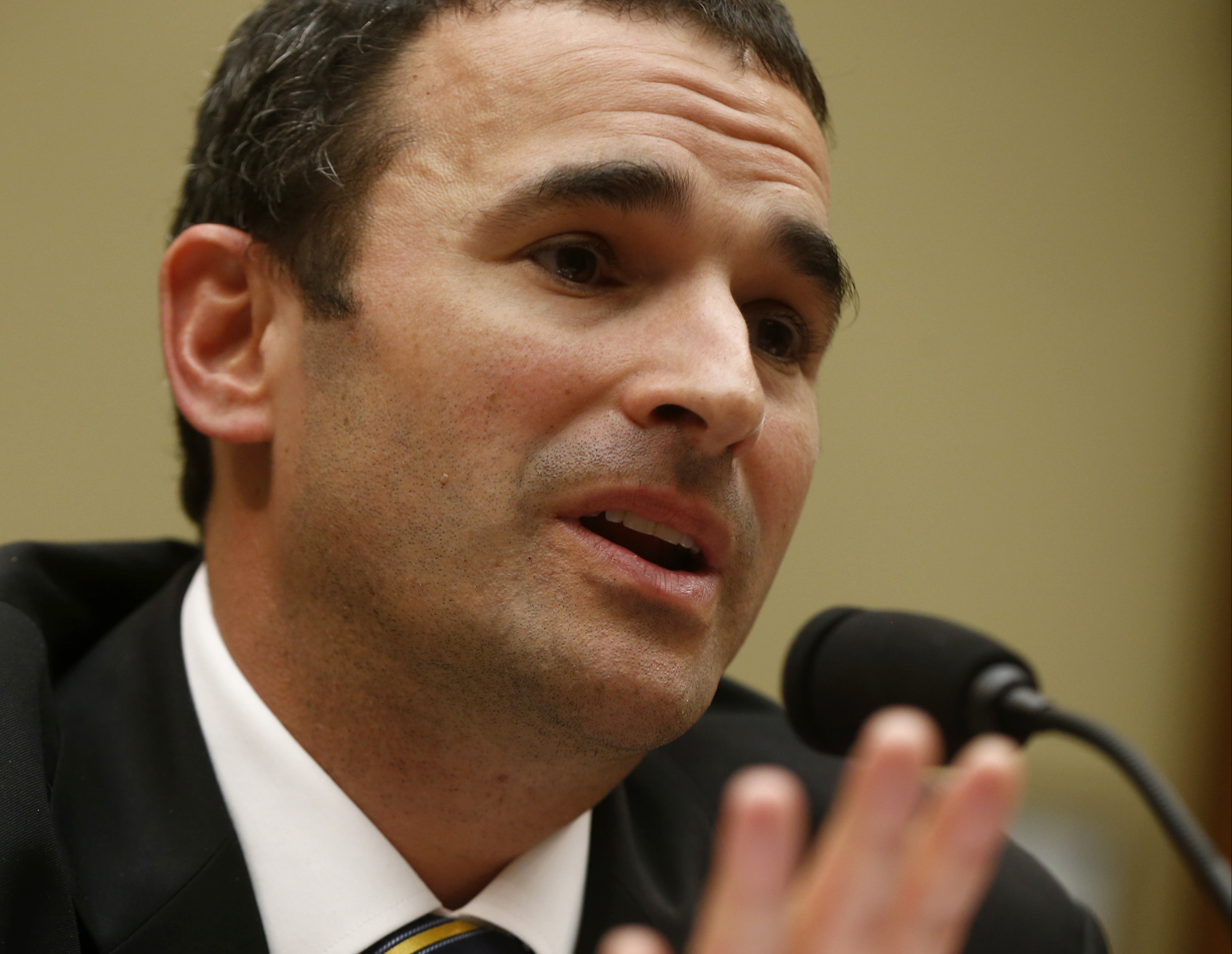 Acting IRS commissioner Danny Werfel testifie on Capitol Hill in Washington. Subsidies to help people buy insurance under President Barack Obama's health care law may be vulnerable to fraud, a Treasury Department watchdog says in a report suggesting that problems with the troubled law could be far from over. Werfel said, "The IRS has a strong, effective system in place for administering the Premium Tax Credit. We have a proven track record of safely and securely transmitting federal tax information and we have a robust and secure process in place to deliver this important credit for taxpayers."
Acting IRS commissioner Danny Werfel testifie on Capitol Hill in Washington. Subsidies to help people buy insurance under President Barack Obama's health care law may be vulnerable to fraud, a Treasury Department watchdog says in a report suggesting that problems with the troubled law could be far from over. Werfel said, "The IRS has a strong, effective system in place for administering the Premium Tax Credit. We have a proven track record of safely and securely transmitting federal tax information and we have a robust and secure process in place to deliver this important credit for taxpayers."WASHINGTON - More troubles for the health care overhaul. Subsidies to help people buy insurance under the law may be vulnerable to fraud, a Treasury Department watchdog said Tuesday in a report suggesting that concerns about the law are far from over.
The rollout of the law has been hurt by canceled policies and problems with the federal website used by people to enroll in health plans, causing political headaches for President Barack Obama and for Democrats in Congress. The new problems concern subsidies that are available to low- and medium-income people who buy health insurance through state-based exchanges that opened in October.
Those subsidies are administered by the Internal Revenue Service in the form of tax credits, and that's where the trouble arises.
"The IRS' existing fraud detection system may not be capable of identifying (Affordable Care Act) refund fraud or schemes prior to the issuance of tax return refunds," said the report by J. Russell George, the Treasury inspector general for tax administration.
"The IRS reported that the long-term limitations of its existing fraud detection system include its inability to keep pace with increasing levels of fraud and to serve the organization's evolving compliance needs," the report said.
Sounding more upbeat, Acting IRS Commissioner Danny Werfel said, "The IRS has a strong, effective system in place for administering the Premium Tax Credit. We have a proven track record of safely and securely transmitting federal tax information and we have a robust and secure process in place to deliver this important credit for taxpayers."
Most of the credits will be paid directly to health insurance companies, with taxpayers seeing the benefit in reduced premiums. Other taxpayers can claim the credits on their federal tax returns, starting with 2014 returns, which will be filed in the spring of 2015.
The subsidies are available to people who do not have access to affordable coverage through their jobs and make between the poverty line and up to four times that level. For a family of four, that's between $23,550 and $94,200.
The Congressional Budget Office has estimated that more than 80 percent of the people who obtain coverage through the law's new insurance markets will be eligible for some level of subsidy to help pay their premiums.
Not everybody will get the same amount. Congress set up the subsidies as tax credits, available on a sliding scale keyed to income and designed to limit the cost of premiums to a fixed share of someone's pay.
A low-income family of four making $35,325, or one and one-half times the poverty level, would pay no more than 4 percent of its income for a policy, or about $1,400 a year. The rest of the policy would be covered by the tax credit, which would be paid directly to insurers by the government.
A similar-sized family in the solid middle class, making $70,650, would be expected to pay up to 9.5 percent of its income for a policy, or about $6,700 annually.
Under the health care law, the IRS is in charge of verifying eligibility for the tax credit and calculating the amount. Taxpayers, however, will have to be careful when they apply for the credits. If taxpayers' incomes increase while they are receiving the credit, and they get a larger credit than they are entitled to, they may have to repay some or all of the credit when they file their federal tax returns.
On the other hand, if taxpayers get a smaller credit than they are entitled to, they can get the difference in the form of a tax refund.
The inspector general's report says the IRS did a good job of accurately calculating the amount of tax credits when auditors ran tests on the system before the health exchanges opened. However, the report warns that IRS systems may not be capable detecting schemes by people who fraudulently claim refunds.
"Without adequate fraud mitigation controls, the IRS may be unable to identify ACA refund fraud or schemes prior to the issuance of erroneous refunds," the report said.
